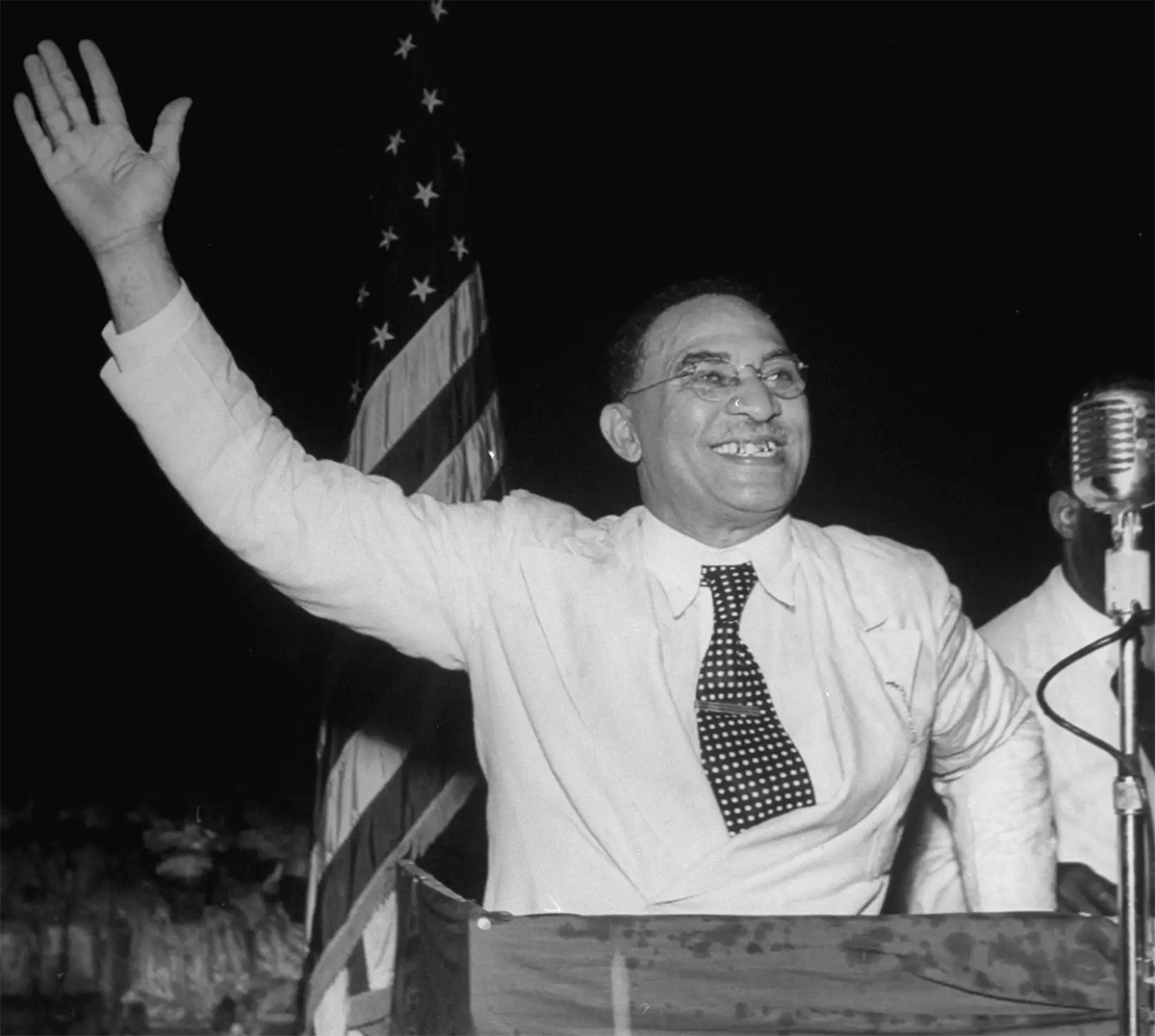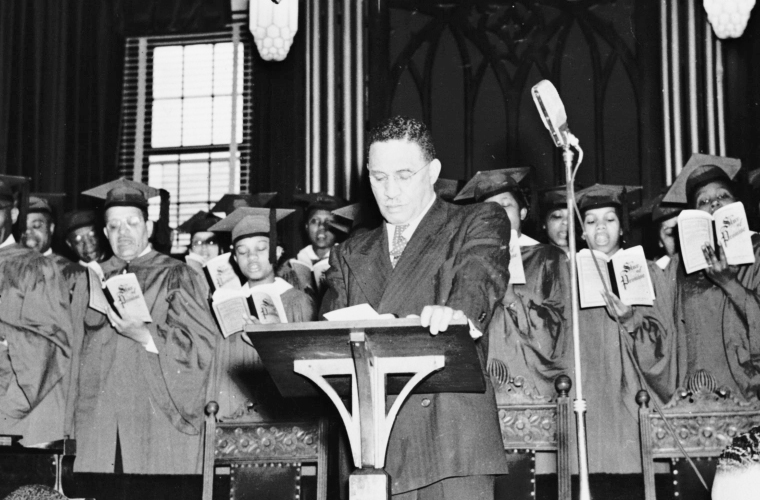April 2, 2018
Elder Lightfoot Solomon Michaux was a pioneering evangelist.
The preacher launched a radio show, “The Radio Church of God,” in 1929 to national acclaim. About two decades later, he became the first minister with a weekly television show. He spread a gospel of individual salvation, saying that converting people to Christianity would help cure the evils and injustices of the world.
He also did something that, until recently, remained virtually unknown to the public: Elder Michaux, an African-American, worked with J. Edgar Hoover’s F.B.I. to publicly discredit the Rev. Dr. Martin Luther King Jr. and give the bureau cover for its intrusive surveillance of the civil rights leader.
That revelation was made in a paper, written by Prof. Lerone A. Martin and published in February in the Religion and American Culture journal. It was already known that Elder Michaux (mi-SHAW) was a fierce critic of Dr. King. But Professor Martin’s research was the first to find that Elder Michaux’s criticisms were part of a coordinated effort with the F.B.I. Professor Martin, of Washington University in St. Louis, discovered the collaboration between Elder Michaux and the F.B.I. when he was working on a book on religious broadcasters. He obtained 230 pages of F.B.I. files on Elder Michaux and discovered that Hoover would send the elder memos full of praise. Professor Martin learned that there was more to the relationship.

Why did you file Freedom of Information Act requests on Elder Michaux?
Ferguson happened here in St. Louis, where I live and, of course, the F.B.I. was involved with that, and I knew the F.B.I. was sort of interested in the role of faith communities, that were playing in Ferguson. So I thought, “Well, I’m sure the F.B.I. probably had this concern in the ’20s, ’30s, and ’40s as it relates to preachers as well.”
What did you discover?
He was what the F.B.I. at the time called a special correspondent, which meant that he was someone the F.B.I. reached out to and had very cordial relationships with and very cooperative relationships with for the majority of his broadcasting career. That included, of course, his cooperation with the F.B.I. to discredit Martin Luther King.
What specific things did he do to discredit Dr. King?
In collaboration with the F.B.I., he laundered some of their counterintelligence for them. So for example, the F.B.I. would pass along some information to him on King about, perhaps, King being a communist, and then Michaux would, of course, scrub that intelligence and present it in some of his broadcasts or sermons. In all, what he does is he colludes with the F.B.I. to preach sermons that discredit Martin Luther King and also even engage in a protest against Martin Luther King that was cleared by the F.B.I.
What were some lines of attack that Elder Michaux took against Dr. King?
On the same day that the F.B.I. writes a memo that says that King is the most dangerous Negro in the world, on that same day they reach out to Michaux and he preaches a sermon against the March on Washington. So the March on Washington has already occurred and, about a month later, Michaux preaches a sermon criticizing the March on Washington and questioning King’s religious commitments. The sermon basically says that King and his religious commitments are questionable, and this whole entire dream that Martin Luther King has will never ever happen and will never come about by marching and protesting. But it will only come about by sort of seeking the Christian conversion of individuals in America.
And it questioned his motivations, right?
The sermon says that King is being motivated not by the Bible, not by religion, but by something else. And of course, the F.B.I. is distributing throughout Washington that King is a communist. And so the sermon is sort of used to sort of provide air cover for the kind of counterintelligence the F.B.I. is engaging in as it relates to Martin Luther King.
Were there other times when Elder Michaux was used to further criticize or delegitimize Dr. King?
A second moment is when Martin Luther King and J. Edgar Hoover have a public spat. King tells a New York Times reporter that the F.B.I. cannot sort of investigate segregation if the F.B.I. has segregationists in it. He questions the F.B.I. and its commitments to racial justice and equality. Eventually, Hoover responds by saying that Martin Luther King is the most notorious liar in the country and that King should not be trusted. So when they have this public spat, the F.B.I. reaches out to Michaux, and, again, he obliges and helps them. He writes an open letter, and releases it to the media, and to the newswires at the time, saying that it was Martin Luther King’s fault and that Hoover is a good Christian servant who is working to ensure the morality of the nation. He has help from the F.B.I. in constructing this letter. He’s given information illegally by the F.B.I. and inserts it into the letter, sort of vouching for the F.B.I.’s efforts in racial justice.
And finally, in 1965 he engages in a protest. Martin Luther King is fresh from the march at Selma. He is then in Baltimore with the Southern Christian Leadership Conference, planning their summer plans, and Michaux reaches out to the F.B.I., letting them know that he’s going to be protesting outside the hotel. So about 100 members of his congregation — between 100, and 125, according to The New York Times — are outside marching, protesting King with signs such as “Communist termites are inside” and “God save America.”
What do you think is the big takeaway now?
We have these African-Americans who are part of this evangelical advisory board in the executive branch. At the same time, we know from documents that have recently been released by the F.B.I. that the executive branch is overseeing the Department of Justice and the F.B.I., who are following Black Lives Matter protesters. I think it allows us to see how these televangelists, who make connections with the executive branch, can be used as religious cover for what the F.B.I. and the executive branch more broadly want to do.
As April 4th rolls around, we’ll see Trump and, I’m sure, ministers across the country who will be praising Martin Luther King, praising his ministry, and mourning his untimely death. But yet their policies and their commitments will be really far from Martin Luther King. In actuality, I think we’ll see they’re in a tradition with Elder Lightfoot Solomon Michaux.

